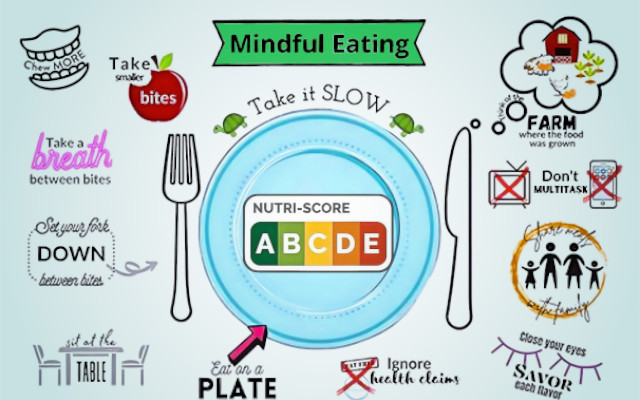A scientific study published in Appetite (Paolassini-Guesnier et al., 2025) demonstrates the correlation between mindful eating (ME), the Mediterranean diet and health. (1)
1) Mindful eating, the five senses
Mindful Eating (ME) is defined as ‘paying attention to the eating experience with the five senses (sight, taste, hearing, smell and touch) and observe the emotional and physical reactions that occur before, during and after the eating experience, without judgment or reaction’ (2,3)
This approach can have a positive effect on food intake, improving the perception of hunger and satiety and reducing emotional and external stimuli to consume excess or nutritionally unbalanced foods. And it has therefore been incorporated into the dietary guidelines of some countries, such as Canada and Germany (4,5).
Observational studies and interventional studies have suggested an association between ME and healthier and less impulsive eating habits. Thus, lower energy intake (kcal), fat, sugar, and a lower risk of food addiction. However, without examining the relationship between mindful eating and overall diet quality.
2) Mindful Eating and overall diet quality. The study
The cross-sectional study under review (Paolassini-Guesnier et al., 2025) aimed to investigate, in a large population sample the association between Mindful Eating and a number of nutritional indicators, including:
– the general quality of the diet
– consumption of ultra-processed foods (UPFs)
– food groups and energy and nutrient intakes
– consumption of organic foods.
2.1) Methods
13,759 selected participants in the NutriNet-Santé cohort study completed the Mind-Eat Scale in 2023, assessing the level of mindful eating (total ME, range 1–5) and its six sub-dimensions, with at least three 24-hour dietary records.
The researchers then performed multivariable linear regressions to analyze the association between the independent variable ME and various indices (dependent variables), adjusted for socio-demographic and lifestyle characteristics, which reflect the nutritional quality of the diet:
– two scores reflecting adherence to the French dietary guidelines (sPNNS-GS2) and the Mediterranean diet (MEDI-LITE score);
– UPF consumption (using the NOVA classification),
– food groups, energy and nutrient intake, organic foods.
2.2) Results
Mindful Eating was positively associated with French Dietary Guidelines and Mediterranean Diet scores, as well as with organic food consumption. And it was negatively associated with energy intake and ultraprocessed food consumption.
Awareness was also associated with the consumption of certain food groups:
– more vegetables, starchy foods, whole grains, legumes, meat and dairy substitutes, fats, sugar and candy, unsalted nuts, and alcoholic beverages
– less meat and cold cuts, dairy products, milk-based desserts, fast food, confectionery and chocolate products, and chocolate-based products.
As for nutrients, higher levels of ME have been associated with:
– a higher intake of vegetable proteins, vegetable fats, polyunsaturated fatty acids (PUFA) and fibre
– a lower intake of total protein, animal protein, animal fat
3) Provisional conclusions
‘Overall, mindful eating was associated with a healthier diet. These findings suggest that ME could be an interesting lever to promote healthy eating habits. Further studies are needed to better understand the relationships between ME, dietary intake and health, particularly through the use of longitudinal studies.’
Synthetic nutritional labeling based on the Nutri-Score system-in this writer’s opinion, based on the scientific consensus already achieved (7)-could further promote Mindful Eating and consumer adherence to dietary guidelines, including the Mediterranean diet model. (8) And it is therefore essential to apply this Front-of-Pack Nutrition Labeling (FOPNL) system to all foods. (9)
Dario Dongo
Credit cover: National Agriculture in the Classroom. Mastering Mindful Eating https://tinyurl.com/4f2uwcpf
Footnotes
(1) Pauline Paolassini-Guesnier, Marion Van Beekum, Emmanuelle Kesse-Guyot, Julia Baudry, Bernard Srour, Alice Bellicha, Rebecca Shankland, Angélique Rodhain, Christophe Leys, Serge Hercberg, Mathilde Touvier, Benjamin Allès, Sandrine Péneau. Mindful eating is associated with a better diet quality in the NutriNet-Santé study. Appetite, Volume 206, 2025, 107797. https://doi.org/10.1016/j.appet.2024.107797n
(2) Susan Albers. Eat, Drink, and Be Mindful (New Harbinger Publications, 2009). ISBN 9781572246157
(3) Warren JM, Smith N, Ashwell M. A structured literature review on the role of mindfulness, mindful eating and intuitive eating in changing eating behaviors: effectiveness and associated potential mechanisms. Nutr Res Rev. 2017 Dec; 30(2):272-283. doi: 10.1017/S0954422417000154
(4) Canada’s Food Guide. Be mindful of your eating habits https://tinyurl.com/mpe67buw
(5) Vollwertig essen und trinken nach den 10 Regeln der DGE. DGE (Deutsche Gesellschaft für Ernährung, German Nutrition Society) https://tinyurl.com/29r232cc
(6) Marta Strinati, Dario Dongo. NOVA classification, natural and ultra-processed foods. Friends and enemies of health. FT (Food Times). September 16, 2020
(7) Dario Dongo. Nutri-Score and health, new confirmations from France and Spain. GIFT (Great Italian Food Trade). 18.12.24
(8) See paragraph 4 of the previous article by Dario Dongo. NutriScore and Nutriform, Professor Serge Hercberg clarifies. GIFT (Great Italian Food Trade). 20.4.23
(9) See paragraph 6 (Nutritional labelling, Nutri-Score) in the previous article by Dario Dongo. Obesity, challenges and opportunities. EU report. FT (Food Times). October 21, 2024
Dario Dongo, lawyer and journalist, PhD in international food law, founder of WIISE (FARE - GIFT - Food Times) and Égalité.




